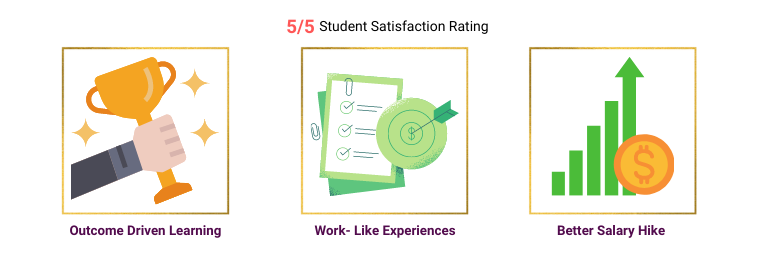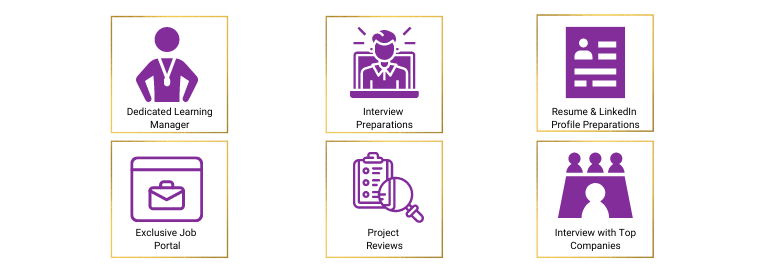DevOps Online Training
This DevOps certification training is designed by industry experts with years of experience(Amazon, Google, Cisco) in building and scaling production applications to millions of users worldwide.
In this course, we will learn to deploy applications to various environment likes testing, staging, and production by building Continuous Integration (CI) and Continuous Delivery (CD) pipelines. Also, we will see end-to-end examples of how to deploy, scale and monitor your application using Docker, Kubernetes, Prometheus and Jenkins.
The course will be completely hands-on and we will make sure to deliver a best-in-class learning experience and provide you with enough knolwedge to start your career as a DevOps Engineer. Also, the course provides sufficient solid foundations to you so that you can start preparing for various certifications like DCA(Docker Certified Associate) and CKAD(Certified Kubernetes Application Developer)
In collaboration with
Online Class
Projects
Hands-On
n/a

30 Hrs Instructor-led Training
Mock Interview Session
Project Work & Exercises
Flexible Schedule
24 x 7 Lifetime Support & Access
Certification and Job Assistance



Course Benefits




DevOps Online Training Course Overview
DevOps certification course has been designed keeping in mind the latest industry needs. You will be trained on the following skillsets which have been curated based on job descriptions posted by companies looking for DevOps Engineers. In online course, you will learn the following aspects:
- In-depth knowledge of DevOps methodology
- Implementing Software Version Control
- Containerizing Code on production using Docke
- Creating CI/CD Pipelines using Jenkins
- Configuration Management using Puppet and Ansible
- Automating build and test using Selenium and Maven
- Container Orchestration using Kubernetes
- Performance Tuning and Monitoring using Nagios
These DevOps classes can be taken up by:
- IT Professionals
- Software Testers
- System Admins
- Solution Architects
- Security Engineers
- Application Developers
- Integration Specialists
Here are some of the requirements to sign up for this DevOps certification training:
- Basic knowledge of Linux or scripting is good to have. For this, we provide you with a free Linux self-paced course to help speed up your learning.
- Prior IT experience would be necessary for learning this technology.
Mentors Pool follows a rigorous certification process. To become a certified DevOps Certification , you must fulfill the following criteria:
- Online Instructor-led Course:
- Successful completion of all projects, which will be evaluated by trainers
- Scoring a minimum of 60 percent in the DevOps Certification quiz conducted by Mentors Pool
You should take up this DevOps course because:
- The DevOps industry is expected to grow six times higher by the year 2022, according to Gartner.
- The average annual salary of a DevOps engineer in the US is $ 136,500, and in India it is approximately INR 666,232 (PayScale).
- Additionally, DevOps and Cloud jobs are going to be among the highest paying jobs in the coming years, according to Forbes.
- A DevOps Architect is the backbone of any organization’s technical team.
Talk to Us
IN: +91-8197658094
The DevOps market is expected to grow from USD 3.42 Billion in 2018 to USD 10.31 Billion by 2023, at a Compound Annual Growth Rate (CAGR) of 24.7%,
Average salary given to a DevOps Engineer is around $127,231 per annum – Indeed.com
Fees
Online Classroom
- 30 Hrs of Instructor-led Training
- 1:1 Doubt Resolution Sessions
- Attend as many batches for Lifetime
- Flexible Schedule
Batches
Dates
Days
Timings
Enrolment validity: Lifetime
Login
EMI Option Available with different credit cards
Cart
Corporate Training
- Customised Learning
- Enterprise grade learning management system (LMS)
- 24x7 Support
- Enterprise grade reporting
Course Content
DevOps Online Training Course Content
Learning objectives:
This module will introduce you to the various concepts DevOps Installation and EC2 Walkthrough
Topics:
- EC2 Walkthrough
- Installation of DevOps Tools in the Cloud
- Git
- Docker
- Selenium
- Jenkins
- Puppet
- Ansible
- Kubernetes
- ELK
Topics:
- DevOps Overview
- What is DevOps and Why do we need DevOps
- Understand the CALMS Model of DevOps
- Understand Continuous Integration, Continuous Delivery and Continuous
- Deployment
- Tool Chains and Ecosystem of Deployment Pipelines
- Pipeline we will be building for this course
Topics:
- What is Version Control?
- Types of Version Control System
- Introduction to SVN
- Introduction to Git
- Git Lifecycle
- Common Git Commands
- Working with Branches in Git
- Merging Branches
- Resolving Merge Conflicts
- Git Workflow
Hands-on Exercise –
1. Git Life cycle Commands
2. Pushing Code to GitHub
3. Stashing Code in Git
4. Creating, Deleting Git Branches
5. Reverting a Push to GitHub
6. Merging branches using git merge
7. Merging branches using git rebase
8. Resolving merge conflicts using the git merge tool
Topics:
- Introduction to Docker
- Understanding Docker Lifecycle
- Components of Docker Ecosystem
- Common Docker Operations
- Creating a DockerHub Account
- Committing changes in a Container
- Pushing a Container Image to DockerHub
- Creating Custom Docker Images using Dockerfile
Hands-on Exercise –
1. Common Docker Operations
2. Creating a DockerHub Account
3. Committing Changes to a Container
4. Pushing container to DockerHub
5. Creating Local Image Repository
6. Building an Image using Dockerfile
Topics:
Need of Configuration Management
Configuration Management Tools
What is Puppet
Puppet Architecture
5.5 Setting up Master-Slave using Puppet
5.6 Puppet Manifests
5.7 Puppet Modules
5.8 Applying configuration using Puppet
5.9 Puppet File Server
Hands-on Exercise –
1. Setting up Master-Slave on AWS
2. Testing Connection of nodes with Puppet
3. Creating a Manifest
4. Deploying Manifest on Node
5. Creating a Module
6. Deploying sample software on nodes using Puppet Modules and Manifests
7. Implementing a File Server Module on Puppet
Topics:
- What is Ansible?
- Ansible vs Puppet
- Ansible Architecture
- Setting up Master-Slave using Ansible
- Ansible Playbook
- Ansible Roles
- Applying configuration using Ansible
Hands-on Exercise –
1. Installing Ansible on AWS
2. Creating a Playbook using YAML
3. Creating an Ansible Role
4. Using Roles in Playbook
Topics:
- What is Continuous Testing?
- What is Maven?
- Introduction to Selenium
- Running Test Cases on Chromium Web Driver
- What is Headless Mode?
Hands-on Exercise –
1. Using Maven to import dependencies in Eclipse
2. Implementing a headless test using Chrome WebDriver
Topics:
- Introduction to Continuous Integration
- Jenkins Master-Slave Architecture
- Understanding CI/CD Pipelines
- Creating an end to end automated CI/CD Pipeline
Hands-on Exercise –
1. Creating a Jenkins Master-Slave on AWS
2. Installing Plug-ins in Jenkins
3. Creating Jenkins Builds
4. Creating Scheduled Builds
5. Triggering Jobs using Git Webhooks
6. Using the Pipeline Plugin in Jenkins
Topics:
- Introduction to Kubernetes
- Docker Swarm vs Kubernetes
- Kubernetes Architecture
- Deploying Kubernetes using Kubeadms
- Alternate ways of deploying Kubernetes
- YAML Files
- Creating a Deployment in Kubernetes using YAML
- Services in Kubernetes
- Ingress in Kubernetes
- Case Study – Kubernetes Architecture
- What are volumes?
- Types of volumes
- Persistent volumes
- Introduction to secrets
- Taints and tolerations
- Introduction to Federation
- Kubernetes Monitoring
- Setting up Prometheus
- Setting up Grafana
Hands-on Exercise –
1. Setting up Kubernetes using kubeadm
2. Installing Kubernetes using kops and GCK
3. Creating a Deployment
4. Creating Services
5. Creating an Ingress
6. Demonstrating the use of Ingress, services, and deployments together
Hands-on Exercise –
1. Creating volumes
2. Creating Persistent Volumes
3. Creating and working with secrets, Taints, and Tolerations
4. Controlling cluster from the outside
5. Setting up and working with Prometheus
6. Setting up and working with Grafana
Topics:
- Agenda
- What is ELK?
- Components of ELK
- ELK Flow
- Features of ELK
- ELK installation
- What is Infrastructure as a code
- IaC vs Configuration Management
- Introduction to Terraform
- Installing Terraform on AWS
- Basic Operations in Terraform
- init
- plan
- apply
- destroy
- Terraform Code Basics
- Deploying an end-to-end architecture on AWS using Terraform
Hands-on Exercise –
1. Analyzing Apache Logs with Logstash & Kibana
2. Analyzing .csv logs with Logstash & Kibana
3. Analyzing Real-Time Web Logs with Beats & Kibana
Course Projects
Deploying Single Container Static App on Google Kubernetes Engine
We will learn how to deploy a static website on the google Cloud Platform (GCP). It is very highly recommended to go through the project Testing App Locally, as the current project is dependent on that.
Automatic Deployment of Single Container Static App on Google Kubernetes Engine with Docker & Travis CI
We will see how to automate the process of deploying a static web app onto GKE with the help of a shell executable and Travis-CI
Deploying Multi-Container App on Minikube and GKE
We will understand how to deploy a multi- container application on MiniKube and GKE, We will learn about Kubernetes Secrets and Kubernetes Persistaent Volume Claim. By the end of this project we will be able to appreciate the use of MiniKube before deploying an application onto production, Like onto google Kubernetes Engine.
Course Certification
This DevOps Course is specially designed for professionals who are engaged in the design, implementation, and management of DevOps deployment pipelines and tool-chains that support Continuous Integration, Continuous Delivery, Continuous Testing, and potentially Continuous Deployment.
This intermediate course level teaches the participants to build a CI/CD pipeline using popular tools such as Git, Maven for Continuous Development, Junit/Selenium for Continuous Testing, Ansible for Continuous Deployment of Infra, Docker and Docker Swarm for Continuous Deployment of Applications and Nagios for Continuous Monitoring.
Through effective hands-on practice sessions, in-depth case studies and training assignments in the course, you will gain mastery of the tools and the best practices to build a completely automated pipeline. Your proficiency in these skills will gear you towards becoming a proven DevOps expert in the IT industry.
A software professional equipped with DevOps knowledge and skillsets is in high demand in the industry. Here is a comparative study of your benefits as a DevOps professional:
1. In terms of salaries, the market worth of DevOps Professionals is very high.
- The mean annual salary of a DevOps Engineer in India is about Rs 666,232
- The average annual salary for a DevOps engineer in the US approximately ranges between $110,000 to $192,000
2. In terms of opportunities, the career benefits of learning DevOps skills include-
- Better and lucrative job opportunities
- Enhanced practical skills and knowledge
3. In terms of future growth, here are some amazing facts and statistics that prove the demand for DevOps professionals-
- DevOps Engineers will continue to be the highest-paid professionals in the existing market
- On Glassdoor’s 50 Best Jobs in America rankings, DevOps engineer ranks sixth
- Among the top 5 sought-after skills, DevOps skills rank very high
4. In terms of popularity, the roles of DevOps architect and engineer are the most sought after with professionals earning up to $158,304 per annum.
Today, every other organization undergoing an enterprise-level transformation is adopting DevOps. Listed below are the results they foresee-
- Seamless operations between the Development and IT Operations teams
- Enterprise-level success in project delivery
- Easy reliable workflows
- Process automation and elimination of departmental silos
- Improved speed and quality of software delivery
- Reduced operational costs
- Enables teams to release more frequently and confidently
IDC estimated that the DevOps software market will reach $8 billion in the year 2022 as compared to the year 2017 which achieved a level of $3.9 billion.
Additionally, Forbes reiterates that cloud-based and DevOps jobs will be among the highest-paying jobs in the coming years.
DevOps can be cited as one of the main reason for which we are on Mars today! Isn’t that cool? Yes, The National Aeronautics and Space Administration (NASA) uses DevOps tools for its mission planning and other major tasks!
By the end of the course, you will have the skillset to work as a DevOps architect or engineer.
Companies and organizations that want to survive and thrive in the 21st century need to adopt DevOps, because this trending approach to software development ensures faster time to market, lesser effort and more customer satisfaction and value. Continuous integration and continuous development tools and technologies help complete the DevOps transformation. More than 40% of global organizations are now said to have embraced DevOps and job openings in this space have increased by more than 72%.
This 4-day DevOps course will help you learn all there is to learn about DevOps and bring about a successful transformation in your team or organization. E
nroll now and embark on a successful career.
Some of the other related DevOps online courses are on DevOps Architect, Docker, Jenkins, Kubernetes, Git and GitHub.
Certification Course Reviews
Certification Course FAQs
You will:
- Learn the importance of DevOps
- Learn about CI/CD process tools and Test Automation tools including Git, Maven, Junit, Selenium
- Learn about Continuous monitoring tools such as Nagios
- Learn about containerization and Docker
On successful completion of the course you will receive a course completion certificate issued by Mentors Pool.
A DevOps Certification proves that you have the most up to date DevOps skills and are ready to take up the responsibilities of a DevOps Engineer. It demonstrates your basic and advanced knowledge of DevOps concepts and how you can implement DevOps into practice effectively.
The average salary of a Development Operations (DevOps) Professional is ₹707,556 (payscale).
DevOps certified professionals who are working in a real-time environment are designated as DevOps Engineers. The main area of focus for DevOps engineer is to maintain a seamless communication between the development and operational side of an organization. They follow the principles of continuous development, continuous testing, continuous integration, continuous deployment and continuous monitoring to make sure that the product gains maximum profitability.
Learning pedagogy has evolved with the advent of technology. Online training adds convenience and quality to the training module. With our 24×7 support system, our online learners will have someone to help them all the time even after the class ends. This is one of the driving factors to make sure that people achieve their end learning objective. We also provide life-time access of our updated course material to all our learners.






